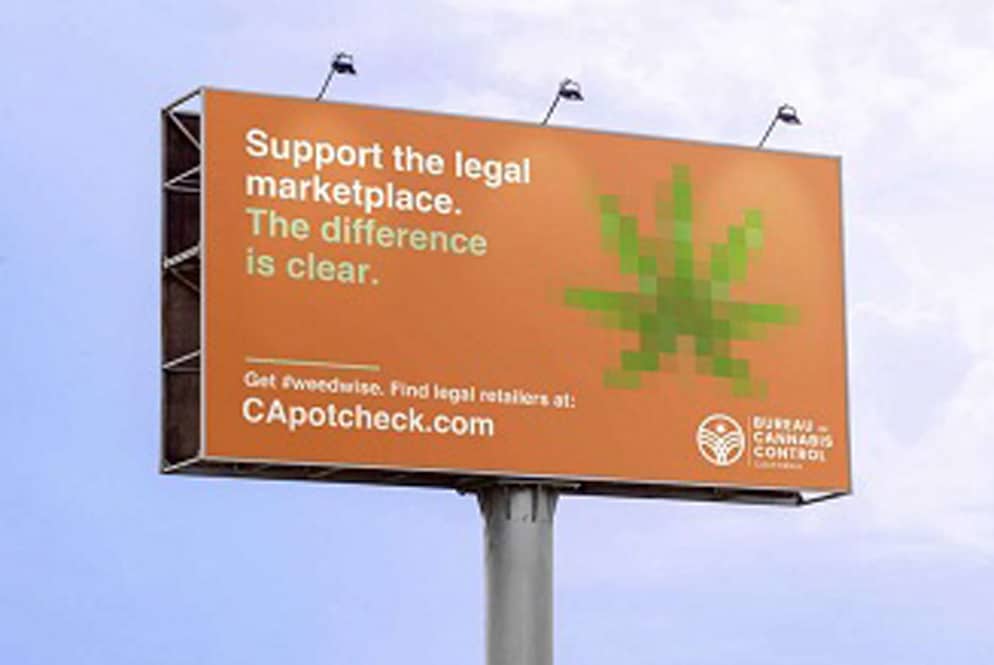It’s bold, brazen, and illegal. Cannabis counterfeiting is popping up at industry trade shows. Understandably, brands are livid, so they, and some states, are fighting back.
To combat the problem, brands are turning to new packaging and labeling in an attempt to help consumers spot fakes. In June, California’s Bureau of Cannabis Control launched “Get #weedwise,” an initiative designed to educate consumers about the risks of unlicensed cannabis.
Many counterfeit products arrive in states where cannabis isn’t yet legal. But they’re available in states that have legalized adult-use, too, where some consumers still turn to the black market to avoid paying sales taxes. States and local jurisdictions can tack on astronomical fees: Buyers pay excise tax of 15 percent in California and a whopping 18 percent in Colorado. While knockoffs may be cheaper than licensed products, the black-market bargains aren’t necessarily a good deal: Fakes can be laced with dangerous chemicals, as the City of Los Angeles noted in a lawsuit it filed against an illegal dispensary. The city alleges the illegal storefront sold cannabis containing a fungicide used on golf courses—one the U.S. Environmental Protection Agency classifies as a toxin.
Newness and the dynamic nature of the cannabis industry enable counterfeiting to thrive, because many of the small business owners who make up the industry don’t have the resources to defend their trademarks and other intellectual property. Meanwhile, a majority of first-time consumers are unfamiliar with cannabis brands. The confluence of brands that can’t fight back and consumers who don’t know enough to make informed decisions has opened the door for a growing gang of imposters.

Counterfeit products generally are of dubious quality, but many consumers aren’t experienced enough to know when what they purchase is not up to a brand’s usual standards. One bad experience can lead to a negative impression of Brand X, and that impression not only discourages the consumer from purchasing legitimate products from the brand, but also may be reflected in reviews they post online and what they tell their friends and family. That’s a critical problem, because 45 percent of new consumers are “strongly influenced” by personal recommendations, according to BDS Analytics.
To create even more confusion, some brands play both sides: They deliberately funnel some of their legitimate products to unlicensed retailers to maximize profits. Then, if asked, they claim the merchandise is counterfeit. That ends up hurting other brands and licensed retailers, who follow their states’ laws. Vaporizer manufacturer Grenco Science was awarded $47 million in damages in 2017 after it successfully sued sixty-five online retailers for selling counterfeits. In an effort to prevent that from happening to him, one Texas pharmacist refuses to sell CBD products until after he has reviewed lab results personally, so he is assured they’re safe and the manufacturer is complying with the law.
In the current environment, companies that are not backdooring products are inadvertently punished because licensed retailers don’t want to take chances and often won’t stock products that have the misfortune of being the frequent target of counterfeiters. So, brands take a hit from both sides: Consumers won’t purchase branded products after having a bad experience with poor-quality counterfeits, and retailers refuse to stock legitimate, high-quality products because consumers won’t buy them.
Efforts are underway to implement more robust anti-counterfeiting programs, such as unique QR codes that consumers can scan to verify a product is legitimate. These sorts of programs will give consumers peace of mind and also empower brands to more easily protect themselves. Anyone leaving a negative product review can be asked for the identifying code from the package. If the code is missing or fake, companies can prove the product was counterfeited.
For now, though, before buying, consumers should ensure the packaging and brand aesthetics are in line with what the company posts on its website or social media. Test and batch data presented on labels indicate products are more likely to be legitimate.
There’s only one way to ensure a product is legitimate: Buy from a licensed retailer or delivery service. But as long as excise taxes remain high, feeding the black market, counterfeiters will remain a threat to the legal industry.

Jason Vegotsky is an entrepreneur with an extensive background in sales and business development. As chief revenue officer at Kush Supply Co. he leads a team of more than forty-five sales professionals; handles operations, shared services,and project management; and is responsible for expanding the company’s nationwide physical presence.










